2020中考英语名词之核心考点
2020年中考英语语法重点纲要

初中英语语法重点汇总Ⅰ. 词法一、名词1、名词的种类❖专有名词❖普通名词✓可数名词个体名词、集体名词✓不可数名词物质名词、抽象名词2、名词的数❖可数名词的数✓单数✓复数➢规则变化●一般情况下词尾-s●以-s、-x、-ch、-sh等结尾的名词词尾-es●以辅音字母-y结尾的词,变y为i,-es●以元音字母-y结尾的词,直接词尾-s●以-f/-fe结尾的词,变f/fe为v,-es●以-o结尾的词,-s或-es➢不规则变化●单词中元音字母发生变化,如man-men,foot,feet●单数复数同形,如sheep-sheep,Chinese-Chinese●复合名词,只变主体名词部分,如boyfriend-boyfriends●其他,如child-children➢特殊情况●只用复数的名词●以-s结尾但并不是复数的名词●集体名词既可以复数,也可以单数●其他❖不可数名词的数✓不可数名词没有复数形式✓有些不可数名词表示具体事物时可数,但意义不同,如chicken,paper3、名词的计量❖可数名词的计量❖不可数名词的计量4、名词所有格❖-’s所有格❖of+名词所有格❖of+-’s 双重所有格❖被名词所有格修饰的名词的省略5、名词在句子中的作用作主语作表语作宾语作宾语补足语作定语作状语作同位语作称呼语二、代词1、人称代词2、物主代词3、反身代词4、相互代词有each other和one another等5、指示代词❖单数:this,that❖复数:these,those6、不定代词❖some和any❖many和much❖both和all❖neither和none❖either、each和every❖another、other(s)和the other(s)✓for another two weeks = for two more weeks ✓some...others...✓one...the other...✓the others = the other +复数❖(a) few和(a) little❖one(s)❖复合不定代词:some-,any-,no-,every-❖复数:these,those7、疑问代词❖指人✓主格:who✓宾格:whom✓所有格:whose❖指物what❖指人或物which8、连接代词who,whom,whose,what,which,whoever,whatever,whichever 9、关系代词who,whom,whose,what,which三、数词1、常见表达法❖日期与时刻✓日期某月某年、某月某日、“月日,年”或“日月,年”✓时刻直接读数表示、用past或to表示❖年龄和年代✓年龄基数词✓年代in the+带有整十的年份的复数或-’s形式❖货币符号+基数词❖编号名词+基数词、the+序数词+名词❖ 小数分数百分数✓ 小数 如three point nine o/zero seven (3.907) ✓ 分数➢ 分子用基数词,分母用序数词,分子大于1时分母序数词后加-s ,如:one third (31),two fifths (52)➢ 分子是2时,常用half ;分子是4时,常用quarter➢ 带分数用“基数词+and+分数”,如:one and two fifths (521)❖ 倍数✓ 倍数+比较级+ than ✓ 倍数+ as +原级+ as ✓ 倍数+ as many/much...+ as...✓ 倍数+ the size/weight/height/length/age...+of... ❖ 约数✓ 大约 about ,nearly ,almost ,some ,around 等 ✓ 超过 over 或more than ✓ 少于 less than ✓ 左右 or so ❖ 算式“+” 用plus 或and ;“-”用minus ;“×”用times 或multiplied by ;“÷”用divided by 2、数词的句法功能❖ 作主语 Twenty of them are from Chonqing. ❖ 作宾语 I like the third best. ❖ 作表语 He is twelve.❖ 作定语 Tom is the tallest of the three boys. ❖ 作状语 Where did you first meet him?❖作同位语We two will help you.3、数词的构成和用法❖基数词✓100以内基数词✓100以上基数词❖序数词✓1~3,4~19✓20~90整十位数✓21以上✓一百、一千、一百万四、介词1、介词的分类简单介词、合成介词、双重介词、短语介词2、介词的位置常规位置、其他位置3、介词短语❖构成介+名,介+代,介+数,介+动名,介+疑问词+不定式,介+从句❖作用作定语、作状语、作表语、作宾语补足语4、介词固定搭配介词与名词、介词与动词、介词与形容词、介词与副词、介词与过去分词5、常见介词用法❖表示时间✓at,in,on✓since,for✓after,in✓by,until/til✓before,after✓from✓during❖表示地点、方位✓at,in,on,to✓on,over,above,under,below✓beside,by,near,nearby,next to,around ✓inside,outside✓into,onto,out of,off✓across,through,past,over,along,down ❖表示方式手段工具✓in,on,by✓in,by,with❖其他✓on,about✓except,except for,besides ✓between,among✓of✓like ✓with✓without ✓for✓as✓against五、冠词1、冠词的用法❖定冠词✓特指的✓谈话双方都知道的✓上文提到的✓独一无二的❖不定冠词✓一类中的任意一个✓第一次谈到✓一类人或物✓数量“一”✓每一,相当于every❖不用冠词✓已有定语✓不可数或复数表一类✓三餐、球类、学科2、冠词的位置❖定冠词❖不定冠词3、有无冠词的区别❖go to school 去上学/ go to the school 到学校去(不一定是学生)❖on earth 究竟/ on the earth 在地球上❖next year 明年/ the next year 第二年❖at table 在吃饭/ at the table 在桌子旁边❖by sea 乘船/ by the sea 在海边❖in bed(睡、病、躺)在床上/ in the bed (某物)在床上❖in class 在上课/ in the class 在班上❖in front of 在(……外部的)前面/ in the front of 在(……内部的)前面六、连词1、按形式简单连词、关联连词、短语连词2、按功能❖并列连词✓表并列and,both...and...,neither...nor...,not only...but also...,as well as✓表转折but,while,yet✓表选择either...or...,or✓表因果so,for❖从属连词✓引导名词性从句主语从句、宾语从句、表语从句、同位语从句✓引导状语从句时间状语、条件状语、原因状语、目的状语、让步状语、结果状语、地点状语、比较状语、方式状语七、副词1、副词的种类时间、地点、频度、方式、程度、疑问、关系、连接、其他2、副词的构成形容词+-ly,与形容词同形3、副词的句法功能作状语、作定语、作表语、作补足语4、副词在句中的位置时间地点、频度、方式、程度、疑问、关系和连接、地点、修饰句子5、副词的比较等级❖构成✓规则✓不规则❖用法6、副词与形容词比较作用不同、句中位置不同、谓语动词7、常见易混副词辨析❖too,either,also,as well ❖already,yet❖ago,before❖hard,hardly❖late,lately❖very,much,very much ❖too,very,quite❖just,just now❖such,so ❖nearly,almost❖fast,quickly,soon❖too much,much too❖how long,how often,how soon ❖farther,further❖sometimes,sometime❖no,not❖maybe,perhaps❖high,highly八、形容词1、形容词的种类性质形容词、叙述形容词2、形容词的构成❖本身就是形容词❖名词+后缀-y,-ful,-less,-ern,-ly,-n❖复合形容词数词+名词、形容词+名词-ed、形容词+动词-ing、名词+动词-ed、副词+动词-ed3、形容词的句法功能作定语、作表语、作宾语补足语、作状语、作主语或宾语4、形容词的位置❖前置或后置❖排序限定词+数量词+描绘性形容词(大小长短形状新旧颜色)+出处+材料+类别用途+名词5、形容词的比较等级❖构成✓规则变化➢long-longer-longest➢nice-nicer-nicest➢big-bigger-biggest➢easy-easier-easiest➢beautiful-more beautiful-most beautiful✓不规则变化➢good/well-better-best➢bad/ill-worse-worst➢little-less-least➢many/much-more-most➢far-farther/further-farthest/furthest➢old-older/elder-oldest/eldest❖用法✓同级比较、同级比较特殊用法✓比较级、比较级特殊用法✓最高级、最高级特殊用法6、含有形容词的固定短语和句型❖固定短语at,about,for,in,of,to,with ❖常用句子✓It’s + adj. + of sb. to do sth.✓It’s + adj + for sb. to do sth.✓sb. be + adj. + to do sth.7、常见易混形容词辨析❖good,fine,nice,well ❖alone,lonely❖interesting,interested ❖exciting,excited ❖ill,sick❖true,real❖huge,large,big,great ❖pleased,pleasant❖elder,older❖farther,further九、动词1、动词的基本形式动词原形、一般现在时第三人称单数、现在分词、过去分词、过去式2、动词的种类❖行为动词及物动词、不及物动词❖连系动词后跟表语❖助动词无意义,语法需要。
2020中考英语必考知识点大全

2020中考英语必考知识点大全(总53页)--本页仅作为文档封面,使用时请直接删除即可----内页可以根据需求调整合适字体及大小--2020中考英语必考知识点大全第一课时名词一、概述1、名词的属性:表示人或事物的名称抽象概念的词叫名词。
2、名词分普通名词和专有名词。
普通名词是表示某一类人或事物,或某种物体或抽象概念的名称。
如:teacher, desks, plates, milk, box等,专有名词表示某一特定的人、事物、地方团体、党派、国家机关、语言、节日等专用的名称。
(运用)如:China, Chinese, Saturday, June, Green, Beijing, Olympic等。
(专有名词的第一个字母要大写)二、可数名词与不可数名词1、可数名词是指表示人或事物,可以用数来计量的名词,有单复数之分。
如:glass-----glasses; book---- books2、不可数名词是指所表示的事物不能用数来计量。
如:paper, rice, water , milk, tea等。
3、有些名词在特定情况下由不可数变为可数名词。
Light travels faster than sound; (light:光线,不可数)The lights are on. (light:灯,可数)4、不可数名词的量的表示不可数名词一般无法用数来计算,前面不能用a或an或数词来表示数量,它的量往往借助于容器来表示。
如:a glass of milk ------ four glasses of milka piece of paper ------ two pieces of papera bag of rice ------ three bags of rice三、可数名词的复数形式(识记、运用)1、可数名词在应用时有单复数之分,单数变复数有规则变化和不规则变化两种。
policeman---policemen; man---men; woman---women;tooth---teeth; foot---feet; sheep---sheep; deer---deer;Japanese--- Japanese; Chinese --- Chinese; fish --- fish四、名词所有格(运用)名词的所有格是表示所有关系的形式,它也有构成上的变化。
2020年中考英语必考语法点
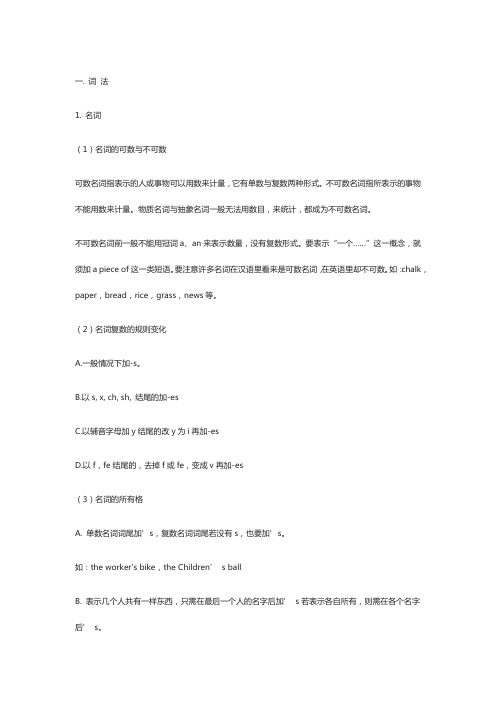
一. 词法1. 名词(1)名词的可数与不可数可数名词指表示的人或事物可以用数来计量,它有单数与复数两种形式。
不可数名词指所表示的事物不能用数来计量。
物质名词与抽象名词一般无法用数目,来统计,都成为不可数名词。
不可数名词前一般不能用冠词a、an来表示数量,没有复数形式。
要表示“一个……”这一概念,就须加a piece of这一类短语。
要注意许多名词在汉语里看来是可数名词,在英语里却不可数。
如:chalk,paper,bread,rice,grass,news等。
(2)名词复数的规则变化A.一般情况下加-s。
B.以s, x, ch, sh, 结尾的加-esC.以辅音字母加y结尾的改y为i再加-esD.以f,fe结尾的,去掉f或fe,变成v再加-es(3)名词的所有格A. 单数名词词尾加’s,复数名词词尾若没有s,也要加’s。
如:the worker's bike,the Children’s ballB. 表示几个人共有一样东西,只需在最后一个人的名字后加’s若表示各自所有,则需在各个名字后’s。
如:This is Lucy and Licy’s room.These are Kate's and jack’s rooms.C. 如果是通过在词尾加—s构成的复数形式的名词,只加’。
如:the students’books,the girls’blouses(另外:名词+of+名词名词是有生命的,我们就用’s结构来表示所有关系。
如果名词所表示的事物是无生命的,我们就要用名词+of+名词的结构来表示所有关系。
)2. 代词人称代词,物主代词,反身代词,指示代词,不定代词(1)人称代词第一人称单数I me my mine myself复数we us our ours ourselves第二人称单数you you your yours yourself复数you you your yours yourselves第三人称单数he him his his himselfshe her her hers herselfit it its its itself复数they them their theirs themselves(2)物主代词物主代词的用法:形容词性物主代词后面一定要跟上一个名词;名词性物主代词可作主语、表语、宾语。
中考英语语法复习名词考点

英语语法名词名词部分的考查重点为:1、名词的可数与不可数性;2、名词单复数在特定情况下的使用;3、名词的普通格与所有格作定语的选用;4、物质名词、抽象名词具体化;名词词义的区别与固定搭配;考点诠释一、名词的各种分类;单、复数的用法及单数名词变复数名词的方式,包括可数名词的复数的变化规则,少数不规则名词的复数形式及部分单复、数同形的名词;考例There is good_________ for you. I've found your lost watch.A. newsB. ideasC. messagesD. thoughtsMy uncle will come to my house for dinner.I want to buy some ___to make a vegetable salad for him.A.meat B.tomatoes C.apple juiceThe teacher said we needed to choose three for the school concert.A. farmersB. doctorsC. driversD. singersAt night the koala bear gets up and eats___________.A.1eaf B.1eaves C. leafsThe PLA man saved three ____lives in the accident.A.children’s B.children C.child D.childs' Come on,children.Help yourselves to some_________ if you like.A.fish and chicken B.fishes and chicken C.fish and chickens D.fishes and chickensAll the ____teachers enjoyed themselves on March 8th,because it was theirown holiday.A.man B.men C.woman D.women二、不可数名词数量的表达法;用“数词或冠词+量词+of+不可数名词”这样的结构来表示,量词可以是单数也可以是复数,但of后面的名词只能用单数;Mr Smith always has _________to tell us.A.some good pieces of news B. some pieces of good news C.some good piece of newes D.some piece of good newes ——Would you like to have a look at some pantsThey may fit you well.一Well,I'd like to try those blue__________.A.pairs B.one C.pant D.pair―Would you like some drinks, boys―Yes, , please.A. some orangesB. two boxes of chocolatesC. some cakesD. two bottlesof orangeexciting news We will have long holiday after the exam.A. What an, aB. What, aC. How an, theD. How, the三、名词所有格及其用法;以-s结尾的单数名词加“’”或“’s”构成所有格;以-s或-es结尾的复数名词只加“’”;不规则复数名词在词尾加“’s”;两者或两者以上共同所有,把“’s”加在最后的名词上;表示各自拥有某件东西时,每个名词都要用所有格形式;_________fathers are both scientists.A.Jim's and Bob B.Jim's and Bob's C.Jim and Bob's D.Jim and Bob_____room is big and bright.They like it very much.A.Tom and Sam B.Tom's find Sam C.Tom and Sam's D.Tom's and Sam's―How’s Joy’s skirt―Her skirt is more beautiful than .A. her sister’s and KateB. her sister and KateC. her sister and Kate’sD. her sister’s and Kate’s四、表示时间、距离、国家、城市、团体、机构等无生命东西的名词,也可以加“'s”来构成所有格;如:today's newspaper.ten minutes,walk,China's industry —Excuse me, is the supermarket far from here—No, it’s about _______.A. 7 minutes walkB. 7 minute walkC. 7 minutes’ walkD. 7 minute’s walk——Come and see me in .——With pleasure.That’s what I'm expecting.A.two or three days' B.two or three day's time C.two or three days' timeI'm going on holiday on the 12th.I have to be back at work on the I'vegot two_______ holiday.A.weeks B.week's C.weeks' D.week五、名词作主语时的主谓一致;主语为单数形式,谓语动词也用单数形式,主语为复数,则谓语动词也用复数;主语形式上是单数,但表达复数意义,那么谓语动词要用复数形式;主语形式上是复数形式但表达单数意义,则谓语动词也采用单数形式;谓语动词的人称和数由最靠近它的主语决定;六、语境中名词的选择;根据语境确定名词的词义,再根据句法进一步确定词形; Studying in a foreign country is a different _____and you can learn a lot.A.event B.exercise C.experience D.exhibition---Would you like some_________---No, thank you. I'm not hungry at all.A. teaB. waterC. breadD.coffeeIt's common ____that the Japanese eat Sushi.A.information B.knowledge C.direction D.instructionThe thing that ____is not whether you fan or not,but whether you try or not.A.minds B.cares C.matters D.considers——I don't know how to use this machine.一It doesn't matter.Here is the____.A.instruction B.direction C.informationD.advertisement——What do you know about____——Line drawings that show how something works.A.pictures B.diagrams C.programmes D.paintings 七、易混名词的区别;主要是要求区别一些常见的容易混淆的名词的用法;---Look, the tall building looks very modern.---Yes, and there is a garden on its ___________. A garden in the air A. top B. ground C. side D. floor一How can I tell one tree from another一You can mostly tell them by the _________of their leaves.07武汉市A.shape B size C.age D color---Oh There isn't enough _________ for us in the bus.---No hurry. Let's wait for the next.A. placeB. landC. roomD. floor0ur school held an activity called “Reco mmend Books to Your Teachers”.The students made a____of 1 000 books.A.note B.1ine C.menu D.1ist语法回顾名词是用来表示人、事物、地点、现象及其他抽象概念等名称的词;英语名词一般分为两类,即专有名词和普通名词;普通名词又可分为个体名词、集体名词、物质名词、抽象名词;个体名词和集体名词一般可数,有单复数之分;物质名词和抽象名词一般不可数;所以从可数性方面看,名词又可分为可数名词和不可数名词;主要是不可数名词.可数名词的单复数以及名词和其他词类如冠词、动词、介词等组成的固定短语,还包括具体情景中名词词义的辨析等知识的综合;一、名词的数1.一般名词的复数形式是在词尾直接加-s构成;如:2.以-s,-x,-ch,-sh结尾的名词,变成复数时在词尾加-es;如:3.以-f和-fe结尾的词变f或fe为v,再加-es;如:注意:roof,gulf,belief,chief,safe,proof,staff等其复数直接在词尾加-s; handkerchief的复数为.4.以辅音字母加一y结尾之名词,先将y变成i,再加-es;如:5.以字母o结尾的词,一般来说,生物名词,包括动、植物名词加-es构成复数;例如:以-o结尾的无生物名词一般直接加-s构成复数;例如:外来的有生物以-o结尾的名词也只加—s构成复数;例如:二不规则变化:1.变化名词中所含的元音字母;如:foot-→ tooth→ goose→ man→2.词尾加-en或-ren;如:child→ ox→3.单复数同形;如:4.表“某国人”的名词,其复数变化有3种情况;1单复数形式相同;如:2变词尾的.man/woman;如:3词尾加-s;如:口诀记忆法:中日同形用不变,英法同盟变a为e,其他一律加s;5.有一些词如hair头发,fruit水果,通常是用它们的单数形式来表示总称;但在表示“几根头发”,“若干种水果”时,则要用复数形式;如:几根白发几种外国水果三复合名词的复数1.一般将主体名词变为复数;如:mother-in-law→passer-by→looker-on→editor-in-chief→2.无主体名词构成的复合词,在词尾加一s;如:go-between→grown-up→3.由man或woman构成的复合名词,两者都要变成复数;如:A man teacher→ a woman doctor→注意:有一些名词,包括一些学科名词,形式上为复数,但意义上却是单数;如:消息;数学;物理;政治四不可数名词的数1.不可数名词就是表示无法分清个体的名词;这类词主要为抽象名词和物质名词;计算不可数名词时,用“数词或冠词+量词+0f+不可数名词”这样的结构来表示,量词可以是单数也可以是复数.但of后的名词只用单数;如:一块苹果派两杯茶三条消息四桶水一滴水一线希望2.有些物质名词可用复数形式表示数量或不同的类别;如:请来两杯咖啡;老年人应食用些保健品;3.有些抽象名词可以用单数或复数形式表示具体的事物;如:Difficulty →Success →二、名词的所有格1.表示有生命的东西的名词所有格;1一般在单数或复数名词后加-'s;如:2以-s结尾的复数名词后直接加“'”;如:3并列名词表示各自所属时,在两个名词之后都加.’s;表示共同所属时.在最后一个名词后加-'s;如:4表示店铺,某人的家,私人开的诊所、餐馆等,其所有格后的名词如shop等可以省略;如:在裁缝店在药店2.表示无生命的东西的名词的所有格,常常用“of+名词”的形式;如:书的封面一张我家的全家福注意:1表示有生命东西的名词,如果名词较长或名词的定语较长.也可用“of+名词”的形式;如:2表示时间、距离、集体、城市、国家、团体、机构及某些惯用语中的名词,可用-s;如:昨天的报纸开车五分钟的路程3.双重所有格被修饰的名词前有不定冠词,指示代词,不定代词或数词等时.要用名词的双重所有格;其结构为“of+名词-'s”;如:我哥哥的一些照片我父亲的一个朋友比较:我父亲的一张照片我父亲的照片三、名词的句法功能1.名词在句中可以作主语、宾语、宾语补定语、定语、状语、同位语和呼语等;如:主语宾语宾语补足语定语状语同位语呼语2.名词作定语时,表示中心词的用途:材料、地点、时间等,和形容词做定语在含义上有所不同;试比较:银币银白色的小车心脏病热情的欢迎石桥铁石心肠1. Today is September 10th. It's______ Day. Let's go and buy some flowers for our teachers.A. TeachersB. Teachers'C. the Teachers'D. Teacher's2 .He had something to write down and asked me for_____,A. a paperB. some papers C some pieces papers D.a piece of paper3. The ______ now is that we have lots of _____ to ask,A. problem; questionsB. question; problems C question; problemD. problem; question4. --- Can I just have a try---Sure. It doesn't if you give a wrong answer.A. matterB. troubleC. mindD. care5 .--- Could you move over a little and make some_______ for me--- Sure. Please.A. placeB. seatC. roomD. ground6. -What would you like to drink, girls-_____, please.A. Two cup of coffeeB. Two cups of coffeesC. Two cups of coffeeD. Two cup of coffees7. During Christmas, people get together and sing Christmas songs far _______.A. funB. wishesC. interestD. thanks8. I'd like something to read. Would you please pass me the _____________ pen B. box C. ruler D. book9. September 10th is ___________.A. Women's DayB. Children's DayC. Mid-autumn DayD. Teachers' Day10. -How do you get home from ______ By bus-No, I walk. ______ isn't very far.A. school, The schoolB. the school, The schoolC. the school, SchoolD. school, School。
2020最新中考英语知识点总结
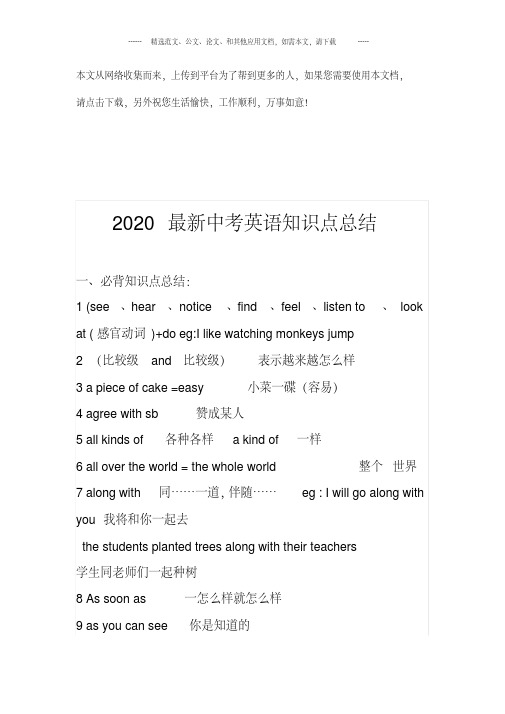
本文从网络收集而来,上传到平台为了帮到更多的人,如果您需要使用本文档,请点击下载,另外祝您生活愉快,工作顺利,万事如意!2020最新中考英语知识点总结一、必背知识点总结:1 (see 、hear 、notice 、find 、feel 、listen to 、look at (感官动词)+do eg:I like watching monkeys jump2 (比较级and 比较级)表示越来越怎么样3 a piece of cake =easy 小菜一碟(容易)4 agree with sb 赞成某人5 all kinds of 各种各样 a kind of 一样6 all over the world = the whole world 整个世界7 along with同……一道,伴随…… eg : I will go along with you我将和你一起去the students planted trees along with their teachers学生同老师们一起种树8 As soon as 一怎么样就怎么样9 as you can see 你是知道的10 ask for ……求助向…要…(直接接想要的东西)11 ask sb for sth 向某人什么12 ask sb to do sth 询问某人某事ask sb not to do 叫某人不要做某事13 at the age of 在……岁时14 at the beginning of …… ……的起初;……的开始15 at the end of +地点/+时间最后;尽头;末尾16 at this time of year 在每年的这个时候17 be /feel confident of sth /that clause +从句感觉/对什么有信心,自信18 be + doing 表:1 现在进行时 2 将来时19 be able to (+ v 原) = can (+ v 原)能够…… 21 be afraid to do (of sth 恐惧,害怕…… 22 be allowed to do 被允许做什么23 be angry with sb 生某人的气24 be angry with(at) sb for doing sth 为什么而生某人的气和什么一样eg : She is as tall25 be as…原级…asas me 她和我一样高26 be ashamed to27 be away from 远离28 be away from 从……离开29 be bad for 对什么有害30 be born 出生于31 be busy doing sth 忙于做什么事be busy with sth 忙于…… 32 be careful 当心;小心和什么不一样33 be different from…… 34 be famous for 以……著名35 be friendly to sb 对某人友好36 be from = come from 来自37 be full of 装满……的be filled with 充满eg: the glass is full of water the glass is filled with water38 be glad+to+do/从句39 be going to + v(原)将来时40 be good at(+doing) = do well in 在某方面善长, 善于…… 41 be good for 对什么有好处42 be happy to do 很高兴做某事43 be helpful to sb 对某人有好处44 be in good health 身体健康45 be in trouble 处于困难中46 be interested in 对某方面感兴趣47 be late for = come late to 迟到eg: Be late for class 上课迟到48 be like 像…… eg : I'm like my mother49 be mad at 生某人的气50 be made from 由……制成(制成以后看不见原材料)51 be made of 由……制成(制成以后还看得见原材料)52 be not sure 表不确定53 be on a visit to 参观54 be popular with sb 受某人欢迎55 be quiet 安静56 be short for 表**的缩写eg: 陶is short for 陶俊杰57 be sick in bed 生病在床58 be sorry to do sth be sorry for sb eg : I am sorry for you59 be sorry to hear that60 be sorry to trouble sb61 be strict in doing sth 严于做某事62 be strict with sb 对某人要求严格63 be strict with sb in sth 某方面对某人严格64 be supposed to do 被要求干什么65 be sure 表确定66 be sure of doing sth 对做某事有信心67 be sure of sth 对做某事有信心68 be sure that sth 对做某事有信心69 be sure to do sth一定会做某事We are sure to learn English well 我们一定能学好英语70 be terrified of + 名/动doing 害怕…… 71 be terrified to do sth 害怕做某事和什么一样72 be the same as … 73 be used to doing sth 习惯做某事My father is usedto getting up early 我爸爸习惯早74 be worth doing 值得做什么75 be(feel) afraid to do sth 害怕做某事be afraid of sth 害怕某物be afraid that 丛句76 because+句子because of +短语eg : He was late because he had a headache He was late because of his headache77 begin to do = start to do 开始做某事以什么开始什么start…with…=begin…with… 78 between…and… 两者之间79 borrow sth from sb 向……借…… lend sth tosb ( lend sb sth 借给……什么东西80 both = the same(as) = not different(from) 表相同81 bother 打扰bother sb to do stheg : I'm sorry to bother you ,but can you tell me to wayto the station我十分道歉打扰你,但是你能告诉我怎么去车站82 by the end of 到……为止83 call sb sth eg : We call him old wang85 catch up with sb 赶上某人86 chat with sb 和某人闲谈take sb to + 地点带某人去某地87 come in 进88 come over to 过来89 come up with 提出eg: Can you come up witha good idea 你能想出一个好办法吗?90 communicate with sb 和某人交流91 consider + doing 考虑做什么eg : Why not consider going to lu zhou 为什么不考虑去泸州?92 dance to 随着……跳舞93 decide to do sth 决定做某事94 do a survey of 做某方面的调查95 do better in 在……方面做得更好96 do wrong 做错97 Don't forget to do sth 不要忘了做某事98 Don't mind +doing /从句/名词不要介意…… 99 each +名(单)每一个…eg : Each student has many books 每一个学生都有一些书100 end up +doing101 enjoy +doing喜欢102 escape from 从……逃跑103 expect to do sth 期待做某事104 fall down 摔下来fall off 从哪摔下来105 fall in love with sb /sth 爱上什么106 far from 离某地远107 find +it +adj +to do 发现做某事怎么样108 find sb/sth +adj 发现什么怎么样eg : I find thebook interesting109 finish 完成+doing(名词)110 fit to sb = be fit for sb 适合某人111 forget to do 没有做而忘了forget doing 做了而又忘了从某某到某某eg: From me for112 from…to… her113 get /have sth down 做完,被(别人)做…eg: I have my hair cut 我理了发(头发被剪了)Tom got his bad tooth pulled out 汤母把他的坏牙拔掉了(被牙医拔掉了)114 get a part-time job= find a part-time job115 get along well with sb = get on well with sb 与某人相处得好116 get along with sb = get on with sb 与某人相处117 get ready for = be ready for为什么而准备118 get sb in to trouble 给某人带来麻烦从某处得到某物120 get…from… 121 give a talk 做报告122 give sth to sb give sb sth 给某人某物123 go fish 钓鱼go swimming 游泳124 go on to do 去做下一件事go on doing 继续做这件事125 go out away from远离go out of 从….离开126 go to school 上学(用于专业的)go to the school 去学校(不一定是上学)127 good way to 好方法128 hate to do 讨厌没做过的事hate doing讨厌做过的事129 have a party for sb 举办谁的晚会130 have a talk 听报告谈一谈131 have been doing 现在完成进行时132 have been to …(地方)……去过某过地方have gone to …(地方)去了某地还没回来133 have fun +doing 玩得高兴134 have sth to do 有什么事要做135 have to do sth 必须做某事136 have trouble (problem) (in) doing sth 做什么事情有麻烦137 have…time +doing138 have…(时间)…off 放……假139 hear sb+do/doing 听见某人做某事/正在做某事140 help a lot 很大用处141 help sb with sth \one's sth 帮助某人某事(某方面)help sb (to) do sth 帮助某人做某事142 hope to do sth 希望做某事143 How about(+doing) = What about(+doing)144 how do you like = what do you think of 你对什么的看法145 if : 是否=wethereg: I don't know if (wether) I should go to theparty 我不知道我是否应该去参加晚会He don't know if (wether) we will arrive ontime tomorrow morning 他不知道我们明天早上是否能准时到达146 if :如果,假如(全部接一般时态)+条件语态从句eg: I'll go to LuZhou if it does't rain 假如明天不下雨,我就去泸州If they change the plan they will let meknow 假如他们要改变计划,他们会让我知道的I'll go to England ,if I have enough money next year如果我明年由足够的钱,我就要去英国147 in one's opinion = sb think 某人认为148 in some ways 在某些方面149 in the end = finally(adv) 最后什么在什么的北方(north 北150 in the north of… sowth 南west 西east 东)151 in the sun 在太阳下152 increase 增加eg : They've increased the prece of petrol by 3%他们把石油价增加了3%153 instead of +(名)代替eg: I'd like an apple instead of a pear 我想要苹果,而不要梨子154 introduce sb to sb 介绍某人给某人introduce oneself 自我介绍155 invite sb to do sth 邀请某人做某事156 It takes sb sometime to do sth 做某人花掉某人多少时间eg : It took me 5 minutes to do my homeworkIt takes me half an hour to cook157 It's +adj +for sb to do sth 对某人来说做某事怎么样158 It's +adj +to do 做某事怎么样159 It's +adj for sb 对于某人来说怎么样It's +adj of sb 对某人来说太怎么样160 It's +adj(for sb) to do(对某人来说)做某事怎么样It's +adj of sb to do sth 对某人来说做某事太怎么样eg : It's nice of you to help me with my English161 It's a good idea for sb to do sth 对…… 来说是个好主意162 It's important to sb 对某人来说很重要eg: It's important to me163 It's time to do sth It's time for sth 到了该去做某事的时间eg : It's time to have class It's time for class 该去上课了164 join = take part in 参加165 just now 刚才166 keep +sb /sth +adj /介词短语让什么保持什么样?167 keep out 不让…… 进入168 keep sb adj 让……保持…… keep healthy 保持健康169 key to +名词表示:某物的钥匙或某题的答案170 key to… anser to … key可以是答题或钥匙取笑…… 171 laugh at… 172 learn by oneslfe 自学173 learn from sb 向某人学习174 learn to do sth 学做某事175 let sb do sth 让某人做某事176 Let sb down 让某人失望eg :We shouldn't let our farents down 我们不应该让我们的父母失望177 live from :离某地远178 live in +大地方/at +小地方居住在某地179 look after = take care of 照顾照看180 lose one's way 谁迷路181 make a decision to do sth 决定做某事182 make friends with sb 和谁成为朋友eg : I want to make friends with you183 make it early 把时间定的早一点184 make on exhibition of oneself 让某人出洋相185 make sb /n +n 使什么成为什么eg : I made her my step moller I made you my wife186 make sb /sth +adj 使某人(某物)怎么样eg : You must made your bed clean187 make sb /sth adj 使某人/某物怎么样188 make sb do sth 让某人做某事189 make up be made up of (被动语态)由……组成190 make…difference to… 191 mind sb to do mind one's doing 介意……做什么192 most +名most of +代193 much too +形容词194 must be 一定195 need +名词196 need sb do sth 需要某人做某事197 need to do (实义动词)need do (情态动词)198 no /neithr of hate to do no /neithr of hate doing199 no +名词200 not anymore = no more 再也不…… eg: He didn't cry any more、副)at all eg: He's not tall at all 201 not… (形she doesn't junp far at all202 not…at all 一点都不203 not…either 表否定,也不eg : I don't japanse either I don't have sister, either 我也没有姐姐204 not…until 直到……才…… 205 offer / provide sb with sth 给某人提供206 offer sb sth ( offer sth to sb 提供什么东西给某人eg : I offer you water (I offer water to you 我给你提供水在谁去那的路上207 on one's way to… 208 on the one hand 一方面on the other hand 另一方面209 on the phone = over the phone 用电话交谈210 on time 准时in time 及时211 one day =some day =someday 一天,有一天212 one of +可数名词的复数形式213 one to another 一个到另一个214 over and over agin 一遍又一遍的eg : He cleaned the floor over and over agin215 part-time job 兼职工作fall-time job 全职工作付……钱pay the bill 开216 pay for… 钱,付钱217 please +do218 please help yourself219 pleased with sb220 pool into = pore into221 practice +doing 练习做某事222 prefer sth to sth 相对……更喜欢…… eg : I prefer physics to chemisty 在物理和化学中,我更喜欢物理prefer sb not to do sth 更愿意… eg: I prefer her not to come 我不喜欢她不来223 pretend to do sth 装着去做什么pretend that从句eg : The two cheats pretended to be working veryhard 这两个骗子装着努力工作224 rather…than 宁可……也不…… eg : I would rather be a doctor than a teacher我愿肯当医生,也不当老师225 regard…as 把……当作…… I regard you as my friend 我把你当作我的朋友226 remid sb about sth 提醒某人什么事remid sb to do sth 提醒某人做某事eg : he remids me about cooking (he remids meto cook 他提醒我做饭227 remid sb of sth 使某人想起什么the words that (which) the teacher talke to remind meof my mother228 return sth to sb 还什么东西给某人229 say to oneself 对自己说230 say to sb 对某人说231 sb spend somemoney on sth 花了多少钱在某事上232 sb spend sometime with sb 花了多少时间陪谁233 sb spend sometime(in) doing sth 花了多少时间做某事234 sb with sb +is sb and sb +are235 see sb do 看见某人做过某事see sb doing 看见某人正在做某事236 seem to do/be +adj 显得怎么样eg : You seem to be tired You seem to be happy237 send +sb sth 送给某人某物238 send…to…把什么寄到哪里去?239 shock 使……震惊eg : Oh , It's only you ! Yougive me a shock 啊,是你呀!吓我一跳240 show sb sth 向某人展示某物241 show sb sth = show sth to sb 拿什么东西给某人看242 show sth to sb 向某人展示某物243 some…others… 一些……另一些…… 从……开始244 start…with… 从……开始begin…with… 245 stay away from 远离…… eg : We're told to stay away from the animals whevisiting the zoo 当我们参观zoo 时,我们要远离动物246 stop doing 停下正在做的事247 stop sb from doing sth 阻止某人做某事248 stop sb(from) doing 阻止某人做某事249 stop to do 停下正在做的事去做下一件事250 such +名这样,这种251 suit sb 适合某人252 surprise sb 使某人惊奇to one's surprise令某人惊奇253 take classes 上课254 take sb to 把某人带去eg : I take you to the hospital255 take walks = take a walk =go for a walk 散步256 ①talk to 对谁说②talk with 和谁说③talk of 谈到④talk about 谈论关于…… 257 talk with sb 和某人说话258 teach sb sth 教某人做某事259 tell sb do sth 告诉某人做某事261 tell sb sth 告诉某人某事tell sb that 丛句tell sb not to do sth262 tell sb 〔not〕to do sth 告诉某人做什么区别263 tell…from…264 thank you for +doing265 the same +名词(doing)+as……相同266 the same…(名)…asas…(adj adv)…as267 the way to do sth =the way of doing st做某方面的方法the way to +地方去哪的路e g :Do you know the way to learn English Do you know the way of learning English268 the way to…(地点)到哪的把什么翻译成什么eg : 270 transalte ……into…… Trasalte English into chinese271 travel with sb和某人去旅游272 try one's best to do sth尽某人最大的努力去做某事eg: I will try my best to learn English well273 try to do sth 想干什么,但没成功try doing sth 想干什么,已经做过了274 try…试衣服have a try 试一下275 turn down 开小←→ turn up 开大276 turn off 关上←→ turn on 打开open 拆开277 upside down 倒着参观某个地方278 visit to… 279 wait for sb 等某人【比较since和for 】Since 用来说明动作起始时间,for用来说明动作延续时间长度。
中考英语—考点02 名词(教师版含解析)
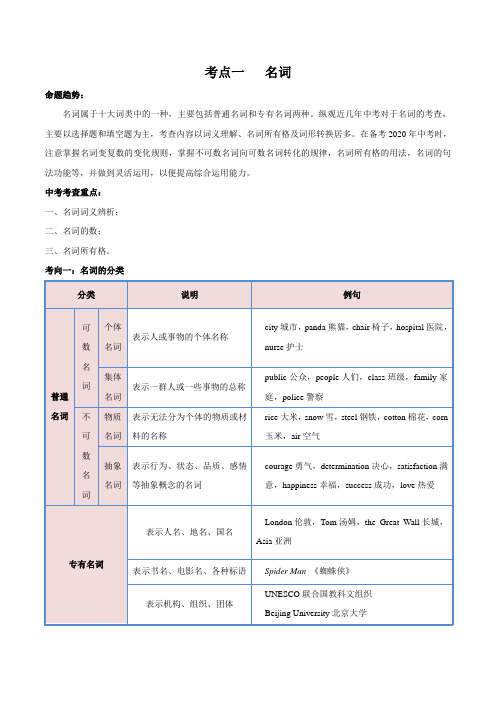
考点一名词命题趋势:名词属于十大词类中的一种,主要包括普通名词和专有名词两种。
纵观近几年中考对于名词的考查,主要以选择题和填空题为主,考查内容以词义理解、名词所有格及词形转换居多。
在备考2020年中考时,注意掌握名词变复数的变化规则,掌握不可数名词向可数名词转化的规律,名词所有格的用法,名词的句法功能等,并做到灵活运用,以便提高综合运用能力。
中考考查重点:一、名词词义辨析;二、名词的数;三、名词所有格。
考向一:名词的分类【知识拓展】集体名词的分类1. 本身是复数,如,cattle牛群,people人们,police警察。
2. 本身单复数均可表示,如audience观众,class班级,club俱乐部,committee委员会,company公司,crew船员,enemy敌人,family家庭,government政府,group组,team队(当这一类词作主语时,谓语动词的单复数形式取决于其表示的具体含义,如果作为一个整体看待时,谓语动词用单数形式;如果指的是具体成员,则谓语动词用复数形式)►The family is the basic unit of society. 家庭是构成社会的基本单位。
►My family are going on a trip this summer. 我们全家今年夏天要外出旅游。
(2020四川广元中考) Sandy really likes eating meat, but she doesn’t like eating .A. breadsB. vegetablesC. chickens【答案】B【解析】考查名词的数。
句意:桑迪确实很喜欢吃肉,但她不喜欢吃蔬菜。
选项中的bread为不可数名词,无单复数形式的变化,可排除;chicken作不可数名词时意为“鸡肉”,无单复数形式的变化。
作可数名词时意为“小鸡”,不符合语境,可排除;vegetable意为“蔬菜”,为可数名词。
初中英语中考必考名词重点、难点、考点
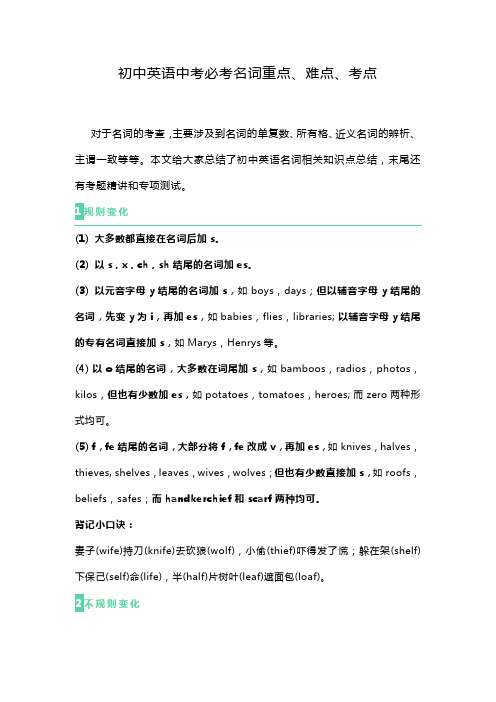
初中英语中考必考名词重点、难点、考点对于名词的考查,主要涉及到名词的单复数、所有格、近义名词的辨析、主谓一致等等。
本文给大家总结了初中英语名词相关知识点总结,末尾还有考题精讲和专项测试。
1规则变化(1) 大多数都直接在名词后加s。
(2) 以s , x , ch , sh结尾的名词加es。
(3) 以元音字母y结尾的名词加s,如boys,days;但以辅音字母y结尾的名词,先变y为i,再加es,如babies,flies,libraries; 以辅音字母y结尾的专有名词直接加s,如Marys,Henrys等。
(4) 以o结尾的名词,大多数在词尾加s,如bamboos,radios,photos,kilos,但也有少数加es,如potatoes,tomatoes,heroes; 而zero两种形式均可。
(5) f,fe结尾的名词,大部分将f,fe改成v,再加es,如knives,halves,thieves, shelves,leaves,wives,wolves;但也有少数直接加s,如roofs,beliefs,safes;而handkerchief和scarf两种均可。
背记小口诀:妻子(wife)持刀(knife)去砍狼(wolf),小偷(thief)吓得发了慌;躲在架(shelf)下保己(self)命(life),半(half)片树叶(leaf)遮面包(loaf)。
2不规则变化(1) 单复数同形:sheep,fish,deer,Chinese,Japanese。
(2) 变内部元音:man——men,tooth——teeth,mouse——mice,foot ——feet,goose——geese。
(3) 其他形式。
child——children,ox——oxen,grown-up——grown-ups,passer by ——passers by,brother in law——brothers in law,man与woman作定语修饰的名词改为复数时,两者都要改为复数,如:two women doctors,many men leaders。
2020中考重点核心词汇详解(真题版)- M字部
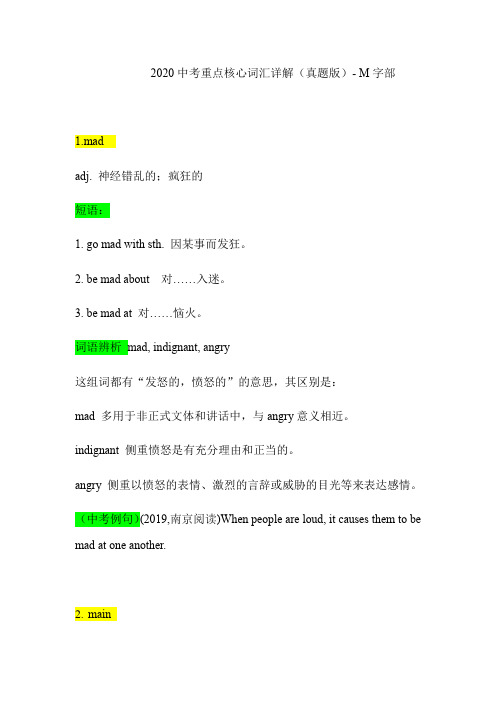
2020中考重点核心词汇详解(真题版)- M字部1.madadj. 神经错乱的;疯狂的短语:1. go mad with sth. 因某事而发狂。
2. be mad about 对……入迷。
3. be mad at 对……恼火。
词语辨析mad, indignant, angry这组词都有“发怒的,愤怒的”的意思,其区别是:mad 多用于非正式文体和讲话中,与angry意义相近。
indignant 侧重愤怒是有充分理由和正当的。
angry 侧重以愤怒的表情、激烈的言辞或威胁的目光等来表达感情。
(中考例句)(2019,南京阅读)When people are loud, it causes them to be mad at one another.2.mainadj. 主要的;首要的mainly adv. 主要地,首要地短语in the main 基本上main purpose 主要目的main part 主要部分,主体;主要零件main idea 主要意思,主旨(中考例句)(2019,徐州阅读)it broke down in the perfect place —off the main road, within walking distance of here.3.managevt. 管理;经营;控制;设法vi. 处理;应付过去manager n.经理;经纪人短语manage with 用…设法对付manage to do 挣扎做某事;设法完成某事(中考例句)(2019,无锡阅读)Then he managed to find his voice.4.mannern. 礼貌,风格,习惯注意:作“礼貌,风格,习惯”解时,通常用复数:短语good/ bad manners 有/没有礼貌。
in a manner 在某种意义上;在某种程度上。
in this manner(中考例句)(2019,徐州阅读)4. It's important for us good manners.(C)A. havingB. haveC. to haveD. had5.markn. & v.痕迹;污点;记号短语mark on 标上;在…上做记录mark in 加画,绘入mark with 在…上面标上…question mark 问号full mark 满分(中考例句)(2019,无锡阅读)the little boy stood up and finally made his way through a door 72.______ was marked “No Admittance(进入)”.6.marketn.市场;集市;vt. 在市场上出售vi. 做买卖短语market economy [经]市场经济market competition 市场竞争stock market 股票市场;证券市场;股票交易international market 国际市场on the market 上市;出售的market share 市场占有率market demand 市场需求home market 国内市场(中考例句)(2019,无锡阅读)It was not long before green tea could be bought from the market.7.marriagen.结婚;婚姻marry v.结婚;嫁娶married n.已婚者短语:1.marry sb. 和某人结婚2. be/get married 结婚3. be/get married to 跟某人结婚(中考例句)(2019,常州阅读)I am sure, it was a song sung by the animals of long ago and have been lost to memory for marry years.8.matchn. 火柴;比赛,竞赛;对手;相配的人(或物);)匹配;v. 相配,相称;相似;与……成对;配对;短语football match 足球赛;足球比赛match with 使和……相匹配well matched 相称,相配have a match 比赛;进行一场比赛;举行一场比赛final match 决赛(中考例句)(2019常州单选)Jim is watching a football match which is shown __________TV. (live)9.mattern.物质;材料;麻烦,毛病短语:no matter 不论,不管no matter how 不管怎样no matter what 不管什么,无论什么subject matter 主题;主旨doesn't matter 无所谓;无关紧要matter of fact n. 事实词语辨析:matter, issue, problem, question这组词都有“问题”的意思,其区别是:matter 含义不很具体,暗示人们考虑和关心的事和话题。
2020年中考英语名词最全总结(共27张PPT)

host 男主人 hostess 女主人
waiter男侍者 waitress 女侍者
prince 王子 princess 公主
actor 男演员 actress 女演员
类别
一般情况
以字母s, x, ch, sh 结尾的词 以辅音字母+y结尾的词 以字母o结尾的词 以字母f或fe结尾的词
可数名词规则构成
一般要大写
组织
1.大多数英语名词没有性的区别。
artist 艺术家 doctor 医生 teacher 教师
2.有些名词具有性别的不同形式。
阳性
阴性
man 男人
woman 女人
uncle 叔叔,伯父
aunt 婶婶,伯母
3.有些名词直接加-ess构成阴性,以-ter, -tor 结尾的词改为tress构成阴性。
2020
名词
课前梳理
名词概述
表示人、事物、地点或抽象概念的名 称的词叫作名词。
类别
定义
例词
个体名词 指单个人或事物的名词
book 书,doctor 医生
可数名词
普 通 名 词
集体名词 物质名词 不可数名词
指一群人或一些事物总称的名 词 指无法分为个体的物质、材料 的名词 指人或事物的品质、情感、状
一般在名词后+____
Tom’s coat; Mary’s mother ; women’s book
以s结尾的名词+____
the students’ pen; the worker’ room; Smiths’ son
表示几人共有一样东西时,只需在最后 This is Tom and Jack’s room. 一个人的名字后+____
最新中考英语_【专题09】2020年中考英语核心词汇详解:M字部
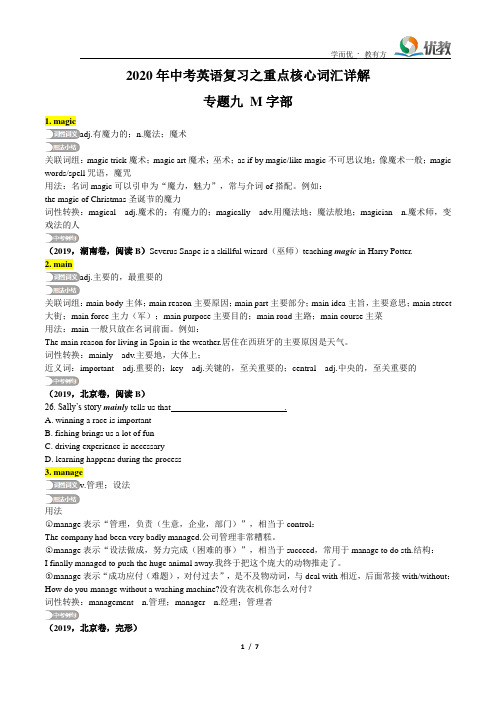
2020年中考英语复习之重点核心词汇详解专题九M字部1. magicadj.有魔力的;n.魔法;魔术关联词组:magic trick魔术;magic art魔术;巫术;as if by magic/like magic不可思议地;像魔术一般;magic words/spell咒语,魔咒用法:名词magic可以引申为“魔力,魅力”,常与介词of搭配。
例如:the magic of Christmas圣诞节的魔力词性转换:magical adj.魔术的;有魔力的;magically adv.用魔法地;魔法般地;magician n.魔术师,变戏法的人(2019,湖南卷,阅读B)Severus Snape is a skillful wizard(巫师)teaching magic in Harry Potter.2. mainadj.主要的,最重要的关联词组:main body主体;main reason主要原因;main part主要部分;main idea主旨,主要意思;main street 大街;main force主力(军);main purpose主要目的;main road主路;main course主菜用法:main一般只放在名词前面。
例如:The main reason for living in Spain is the weather.居住在西班牙的主要原因是天气。
词性转换:mainly adv.主要地,大体上;近义词:important adj.重要的;key adj.关键的,至关重要的;central adj.中央的,至关重要的(2019,北京卷,阅读B)26. Sally’s story mainly tells us that .A. winning a race is importantB. fishing brings us a lot of funC. driving experience is necessaryD. learning happens during the process3. managev.管理;设法用法○1manage表示“管理,负责(生意,企业,部门)”,相当于control:The company had been very badly managed.公司管理非常糟糕。
2020年中考英语语法必考知识点总结
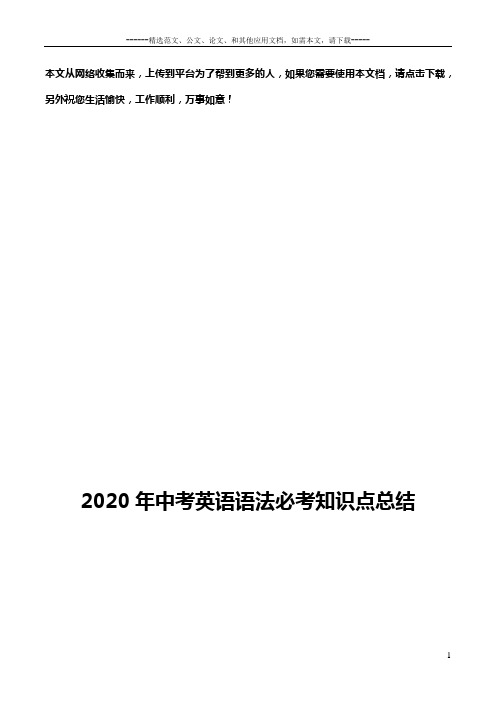
本文从网络收集而来,上传到平台为了帮到更多的人,如果您需要使用本文档,请点击下载,另外祝您生活愉快,工作顺利,万事如意!2020年中考英语语法必考知识点总结一、词类、句子成分和构词法:1、词类:英语词类分十种:名词、形容词、代词、数词、冠词、动词、副词、介词、连词、感叹词。
1、名词(n.):表示人、事物、地点或抽象概念的名称。
如:boy, morning, bag, ball, class, orange.2、代词(pron.):主要用来代替名词。
如:who, she, you, it .3、形容词(adj..):表示人或事物的性质或特征。
如:good, right, white, orange .4、数词(num.):表示数目或事物的顺序。
如:one, two, three, first, second, third, fourth.5、动词(v.):表示动作或状态。
如:am, is,are,have,see .6、副词(adv.):修饰动词、形容词或其他副词,说明时间、地点、程度等。
如:now, very, here, often, quietly, slowly.7、冠词(art..):用在名词前,帮助说明名词。
如:a, an, the.8、介词(prep.):表示它后面的名词或代词与其他句子成分的关系。
如in, on, from, above, behind.9、连词(conj.):用来连接词、短语或句子。
如and, but, before .10、感叹词(interj..)表示喜、怒、哀、乐等感情。
如:oh, well, hi,hello.2、句子成分:英语句子成分分为七种:主语、谓语、宾语、定语、状语、表语、宾语补足语。
1、主语是句子所要说的人或事物,回答是“谁”或者“什么”。
通常用名词或代词担任。
如:I’m Miss Green.(我是格林小姐) 2、谓语动词说明主语的动作或状态,回答“做(什么)”。
2020年中考英语重点知识归纳

2020年中考英语重点知识归纳2020年中考英语重点知识归纳以下是中考英语的重点知识:1.使用“as …as…”结构:你和XXX是一样好的孩子。
You’re as good a boy as Tom.2.使用“too …to”和“so …that sb。
can’t …”句型转换:前者为简单句,主语只有一个,而后者为复合句,主语有两个,试比较:The man was too angry to be able to speak.The man was so angry that he XXX.He is too young to get married.He is not old enough to get married.The book is too difficult for me to read.The book is not easy enough for me to read.3.形容词原级表示比较级含义:John is not as stupid as XXX.John is less stupid than XXX.XXX cleverer than XXX.4.使用比较级表示最高级:John is taller than any other boy in the class.John is the tallest boy in the class.5.使用“the more … the more …”表示“越……越……”:The more books you read。
the wider your knowledge is.The more food you eat。
the fatter you are.More and more students are realizing the importance of a foreign language.XXX.中考考点—词组:1.“after”和“in”这两个介词都可以表示“……(时间)以后”的意思。
中考英语必考知识点~名词知识必备精粹
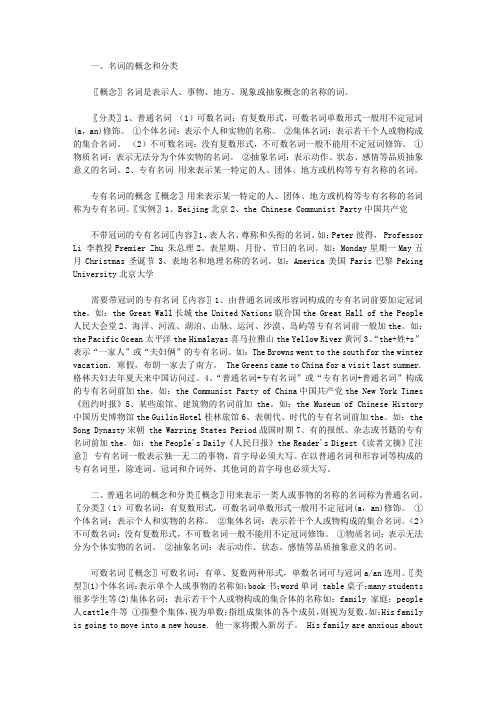
一、名词的概念和分类〖概念〗名词是表示人、事物、地方、现象或抽象概念的名称的词。
〖分类〗1、普通名词(1)可数名词:有复数形式,可数名词单数形式一般用不定冠词(a,an)修饰。
①个体名词:表示个人和实物的名称。
②集体名词:表示若干个人或物构成的集合名词。
(2)不可数名词:没有复数形式,不可数名词一般不能用不定冠词修饰。
①物质名词:表示无法分为个体实物的名词。
②抽象名词:表示动作、状态、感情等品质抽象意义的名词。
2、专有名词用来表示某一特定的人、团体、地方或机构等专有名称的名词。
专有名词的概念〖概念〗用来表示某一特定的人、团体、地方或机构等专有名称的名词称为专有名词。
〖实例〗1、Beijing北京2、the Chinese Communist Party中国共产党不带冠词的专有名词〖内容〗1、表人名、尊称和头衔的名词。
如:Peter彼得, Professor Li 李教授Premier Zhu 朱总理2、表星期、月份、节日的名词。
如:Monday星期一May五月Christmas圣诞节3、表地名和地理名称的名词。
如:America美国 Paris巴黎Peking University北京大学需要带冠词的专有名词〖内容〗1、由普通名词或形容词构成的专有名词前要加定冠词the。
如:the Great Wall长城the United Nations联合国the Great Hall of the People 人民大会堂2、海洋、河流、湖泊、山脉、运河、沙漠、岛屿等专有名词前一般加the。
如:the Pacific Ocean太平洋the Himalayas喜马拉雅山the Yellow River黄河3、“the+姓+s”表示“一家人”或“夫妇俩”的专有名词。
如:The Browns went to the south for the winter vacation.寒假,布朗一家去了南方。
The Greens came to China for a visit last summer. 格林夫妇去年夏天来中国访问过。
2020年中考英语热点考点附解答: 名词

热点考点:名词一、教材重点回顾:名词( Noun)表示人、事物、地点或抽象概念名称的词叫做名词。
它是中考考查的重要项目之一,考查的题型很多, 有单项选择、完成句子、完形填空、综合填空等, 其中名词的数及名词所有格是中考热点。
名词分类:普通名词:可数名词和不可数名词;名词专有名词1、名词的数1).可数名词的数:可数名词有单数和复数两种形式。
表示一个人或物用单数形式;表示两个或两个以上的人或物用复数形式。
(1)规则名词的复数形式:①一般在词尾加s。
如:lake--lakes, book--books, pen--pens, map--maps, flower--flowers, ruler--rulers.②以s, x, sh, ch结尾的名词加es。
如: box--boxes, class--classes, dish--dishes, watch--watches③以辅音字母+y结尾的名词,将y变i再加es。
但以元音字母+ y结尾的名词变复数时,直接加S。
如:family--families, baby--babies, boy--boys, toy-- toys.④以o结尾的名词,一般在词尾直接加s。
如: radio- radios photo- photos piano-pianos但在初中阶段常考的三个以o结尾的名词变复数时要加es: tomatoes, potatoes, heroes(英雄).⑤以f或fe结尾的名词,复数形式多数是变f或fe为v,再加es。
初中阶段常考的有9个,如:wife--wives, knife--knives, wolf--wolves, thief--thieves, shelf--shelves, self--selves, life--lives, half--halves, leaf--leaves这9个单词可以编成一段顺口溜来记忆:妻子执刀去宰狼,小偷吓得发了慌,躲在架后保已命,半片树叶遮目光;但也有直接加s的。
初中中考英语必考知识点总结
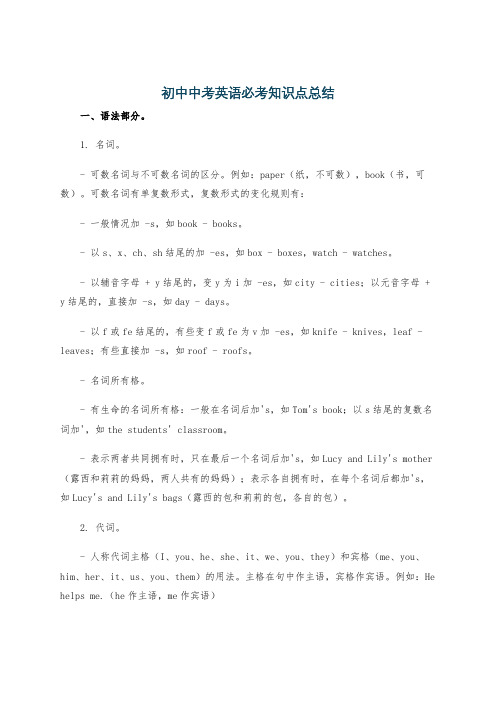
初中中考英语必考知识点总结一、语法部分。
1. 名词。
- 可数名词与不可数名词的区分。
例如:paper(纸,不可数),book(书,可数)。
可数名词有单复数形式,复数形式的变化规则有:- 一般情况加 -s,如book - books。
- 以s、x、ch、sh结尾的加 -es,如box - boxes,watch - watches。
- 以辅音字母 + y结尾的,变y为i加 -es,如city - cities;以元音字母 + y结尾的,直接加 -s,如day - days。
- 以f或fe结尾的,有些变f或fe为v加 -es,如knife - knives,leaf - leaves;有些直接加 -s,如roof - roofs。
- 名词所有格。
- 有生命的名词所有格:一般在名词后加's,如Tom's book;以s结尾的复数名词加',如the students' classroom。
- 表示两者共同拥有时,只在最后一个名词后加's,如Lucy and Lily's mother (露西和莉莉的妈妈,两人共有的妈妈);表示各自拥有时,在每个名词后都加's,如Lucy's and Lily's bags(露西的包和莉莉的包,各自的包)。
2. 代词。
- 人称代词主格(I、you、he、she、it、we、you、they)和宾格(me、you、him、her、it、us、you、them)的用法。
主格在句中作主语,宾格作宾语。
例如:He helps me.(he作主语,me作宾语)- 物主代词分为形容词性物主代词(my、your、his、her、its、our、your、their)和名词性物主代词(mine、yours、his、hers、its、ours、yours、theirs)。
形容词性物主代词后面要接名词,名词性物主代词相当于名词,可以单独使用。
2024年中考英语阅读高频核心词汇(按词性划分)
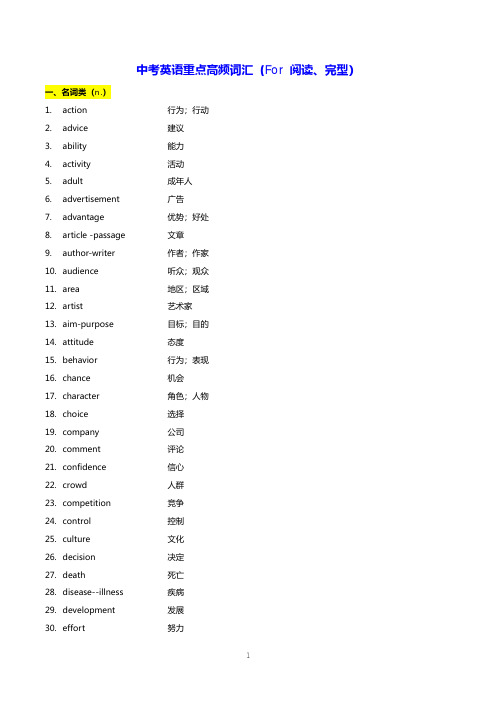
中考英语重点高频词汇(For阅读、完型)一、名词类(n.)1.action行为;行动2.advice建议3.ability能力4.activity活动5.adult成年人6.advertisement广告7.advantage优势;好处8.article-passage文章9.author-writer作者;作家10.audience听众;观众11.area地区;区域12.artist艺术家13.aim-purpose目标;目的14.attitude态度15.behavior行为;表现16.chance机会17.character角色;人物18.choice选择pany公司ment评论21.confidence信心22.crowd人群petition竞争24.control控制25.culture文化26.decision决定27.death死亡28.disease--illness疾病29.development发展30.effort努力31.effect-influence影响32.engineer工程师33.exam-test考试34.exercise运动;练习35.experiment实验36.experience经历;经验37.energy能量;精力38.environment环境39.event事件;公开活动40.friendship友情;友谊41.flight飞行;航班42.habit习惯rmation信息44.invention发明(物)45.invitation邀请46.lie谎言47.lesson课;教训;道理48.lecture-speech讲座;演讲49.medal奖牌50.member成员51.message消息;留言52.magazine杂志53.method--way方法54.nature自然55.newspaper报纸56.opinion意见;观点57.order顺序;订单;命令58.pain痛苦59.performance表演;表现60.poem--poet诗歌;诗人61.post帖子62.poster海报63.population人口64.purpose目的65.price价格;价钱66.prize奖项;奖67.result结果68.relationship关系69.research调查70.review评论;复习71.science-scientist科学—科学家72.secret秘密73.sign标识牌;指示牌74.situation情形;情况75.skill技能76.study学习;研究77.society社会78.spirit精神79.space太空;空间80.stage舞台81.store-shop商店82.survey研究;调查问卷83.success成功84.surprise惊奇;惊讶;惊喜85.system系统86.task任务87.tear眼泪88.teenager青少年89.thought想法;思考90.view观点;风景;视野91.visitor游客;访客92.university-college大学93.universe宇宙94.work(s)工作;作品95.website网站二、动词类(v.)1.advise建议2.agree--disagree同意/不同意3.allow允许4.accept接受5.achieve实现;达到6.affect影响7.argue争论;辩论8.appear出现;似乎9.avoid避免10.attend参加;出席11.book预订12.change改变13.choose选择plete-finish完成15.continue继续municate交流17.consider认为;考虑18.create创造;创新19.decide决定20.depend依靠;依赖21.describe描述22.discover发现23.encourage鼓励24.expect期望;指望25.fail--succeed失败--成功26.follow跟随;跟着27.guide指导;引导28.hold举行;举办29.hug拥抱30.hurt伤害31.improve提高32.imagine想象33.increase提升;提高34.infer推断35.invite邀请36.invent发明37.influence影响38.introduce介绍39.knock敲门40.lie说谎(lie-lied-lied);平躺(lie-lay-lain)--lying41.mention提到;提及42.nod点头43.obey遵守anize组织45.order命令;下订单46.protect保护47.prefer更喜欢48.provide提供49.punish惩罚50.refer to指代;指的是51.refuse拒绝52.realize意识到;实现53.receive收到54.reduce减少55.remind提醒;想起56.respect尊重57.save节约;节省58.search查找;搜寻59.seem似乎60.shake摇(头);摇摆61.shout大喊;大叫62.show表明;表现63.sigh叹息64.solve解决65.study研究66.support支持67.understand理解68.wonder想知道三、形容词、副词类(adj./adv.)1.afraid害怕的2.alone独自的3.annoyed生气的;恼怒的4.bored烦的;无聊的5.certain确定的(sure)mon常见的;相同的(have...in common)7.confident自信的;有信心的8.convenient方便的;便利的9.dangerous危险的10.embarrassed尴尬的11.excited激动的;兴奋的12.familiar熟悉的13.famous著名的;出名的14.foreign外国的15.frightened害怕的;惊恐的16.legal--illegal合法的--非法的17.local当地的18.necessary必需的;必要的19.nervous紧张的20.terrible糟糕的;可怕的21.tired累的;困的22.online线上的23.own自己的24.obvious明显的25.ordinary普通的26.patient耐心的27.perfect完美的28.pleased开心的;满意的29.polite有礼貌的30.popular受欢迎的;流行的31.quiet安静的32.relaxed放松的33.satisfied满意的34.silent安静的;寂静的35.similar相似的36.social社会的;社交的37.suitable合适的38.whole全部的;整体的39.wide-widely宽的;广泛的40.wise睿智的;聪明的41.worried担心的;担忧的42.quite-very很;相当地43.actually事实上44.accurately准确地45.certainly确定地;一定地46.correctly正确地pletely完全地48.directly直接地49.exactly准确地50.fortunately幸运地51.hardly几乎不52.nearly接近;几乎53.really真正地;真地54.recently最近;近来55.suddenly突然地四、介词、连词类(prep./conj.)1.of A of B: B的A2.between在……(两者)之间3.among在……(多者)之间4.during在……期间5.as①作为②=because因为...③=when当……6.on①在……上面②=about关于③be on开着的;进行着的(状态)7.by①by sb/sth被某人/物②by the river在河边③by car/bus通过……④by doing通过做某事8.to①to sb给某人②to do sth为了做某事③to doing sth (搭配中的介词)9.with①with sb和某人;②with sth:用某物(with a pen);有了某物(with money);带着某物(with a smile)10.except除了……11.although--though虽然;尽管12.but①但是②除了(have no choice but...)③not...but...不是……而是……13.besides除此之外;此外14.if①如果(状语从句)②是否(宾语从句)15.unless除非16.until直到(not...until直到……才……)17.since①自从②既然;因为18.still①仍然②静止的19.while①=when:当……时候②表前后的对比:然而③一会儿(after a while)20.however然而(=but)21.therefore因此(=so)。
2020年中考英语重点知识归纳_中考英语精华知识点汇总
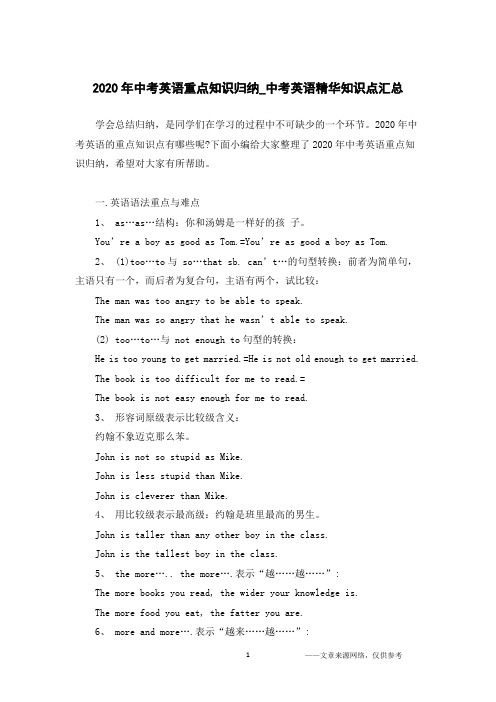
2020年中考英语重点知识归纳_中考英语精华知识点汇总学会总结归纳,是同学们在学习的过程中不可缺少的一个环节。
2020年中考英语的重点知识点有哪些呢?下面小编给大家整理了2020年中考英语重点知识归纳,希望对大家有所帮助。
一.英语语法重点与难点1、 as…as…结构:你和汤姆是一样好的孩子。
You’re a boy as good as Tom.=You’re as good a boy as Tom.2、 (1)too…to与 so…that sb. can’t…的句型转换:前者为简单句,主语只有一个,而后者为复合句,主语有两个,试比较:The man was too angry to be able to speak.The man was so angry that he wasn’t able to speak.(2) too…to…与 not enough to句型的转换:He is too young to get married.=He is not old enough to get married.The book is too difficult for me to read.=The book is not easy enough for me to read.3、形容词原级表示比较级含义:约翰不象迈克那么苯。
John is not so stupid as Mike.John is less stupid than Mike.John is cleverer than Mike.4、用比较级表示最高级:约翰是班里最高的男生。
John is taller than any other boy in the class.John is the tallest boy in the class.5、 the more….. the more….表示“越……越……”:The more books you read, the wider your knowledge is.The more food you eat, the fatter you are.6、 more and more….表示“越来……越……”:More and more students realized the importance of a foreign language.Our country is getting stronger and stronger.二.中考考点—词组1. after, in这两个介词都可以表示“……(时间)以后”的意思after 以过去为起点,表示过去一段时间之后,常用于过去时态的句子中?如:She went after three days. 她是三天以后走的in 以现在为起点,表将来一段时间以后,常用于将来时态的句子中如:She will go in three days. 她三天以后要走2. how long, how often, how soonhow long指多长时间,主要用来对一段时间(如three days, four weeks 等)提问?如:How long ago was it? 这是多久前的事了?how often指每隔多久,主要用来对频率副词或状语(如once a week等)提问?如:—How often does he come here? —Once a month. 他(每隔)多久来一次?每月一次。
- 1、下载文档前请自行甄别文档内容的完整性,平台不提供额外的编辑、内容补充、找答案等附加服务。
- 2、"仅部分预览"的文档,不可在线预览部分如存在完整性等问题,可反馈申请退款(可完整预览的文档不适用该条件!)。
- 3、如文档侵犯您的权益,请联系客服反馈,我们会尽快为您处理(人工客服工作时间:9:00-18:30)。
中考英语名词之核心考点名词( Noun)表示人、事物、地点或抽象概念名称的词叫做名词,它是中考考查的重要项目之一。
中考考查的题型很多, 有单项选择、完成句子、完形填空、综合填空等, 其中名词的数及名词所有格是中考热点。
名词的数1)可数名词的数可数名词有单数和复数两种形式。
表示一个人或物用单数形式;表示两个或两个以上的人或物用复数形式。
(1)规则名词的复数形式:①一般在词尾加s。
如:lake--lakes,book--books,pen--pens,map--maps,flower--flowers,ruler--rulers②以s,x,sh,ch结尾的名词加es。
如:box--boxes,class--classes,dish--dishes,watch--watches③以辅音字母+y结尾的名词,将y变i再加es。
但以元音字母+ y结尾的名词变复数时,直接加S。
如:family--families,baby--babies,boy--boys,toy-- toys④以o结尾的名词,一般在词尾直接加s。
如:radio- radios ,photo- photos ,piano-pianos但在初中阶段常考的三个以o结尾的名词变复数时要加es:tomato es,potato es,hero es(英雄)。
⑤以f或fe结尾的名词,复数形式多数是变f或fe为v,再加es。
初中阶段常考的有9个。
如:wife--wives,knife--knives,wolf--wolves,thief--thieves,shelf--shelves,self--selves,life--lives,half--halves,leaf--leaves这9个单词可以编成一段顺口溜来记忆:妻子执刀去宰狼,小偷吓得发了慌,躲在架后保己命,半片树叶遮目光。
但也有直接加s的。
如:roof--roofs,gulf- -gulfs(2)不规则名词的复数形式①改变单数名词中的元音字母,或加后缀。
如:foot-- feet,tooth--teeth,goose-- geese,mouse-- mice,child--children,woman-- women②表示“某国人”的名词的单复数因习惯不同而各异。
如:a Chinese --two Chinese,a Japanese--two Japanese (单复数词形相同)an American--two Americans,a German--two Germans (词尾直接加s)此外,Russian,African,Asian,Australian,Arab,Canadian,Italian,European 等变复数时都是直接在词尾加s。
【特别提示】an Englishman -three Englishmen,a Frenchman--six Frenchmen 记忆口诀:中日不英法变,其他s加后面。
(3)复合名词的复数形式①将复合名词的中心词变为复数。
如:passer(s)-by过路人,daughter( s)-in-law儿媳妇,step mother(s)继母②名词+名词构成的复合名词,将第二个名词变为复数。
如:apple tree--apple trees,shoe shop--shoe shops,letter box--letter boxes,girl student--girl students注意:①复合名词为man,woman加另外一个名词构成,变复数时要把这两个词都变成复数。
如:man teacher-- men teachers,woman doctor--women doctors②sport和其他名词构成词组时,习惯上用复数形式sports。
如:a sports hat sports news sports shoes(4)特别的复数形式①单数形式代表复数含义。
如: cattle牛,people人们,police 警务人员②只用复数形式。
如: trousers裤子,clothes衣服,gloves 手套,glasses眼镜,stockings 长简袜,thanks 感谢③单复数同形。
如: deer鹿,sheep绵羊,fish 鱼( 注意:fishes指鱼的种类)单复同形口诀:中日好友来聚会,绵羊、鹿、鱼把家回。
2)不可数名词的数不可数名词一般没有复数形式,它包括抽象名词和物质名词。
如: health,advice,milk,water,English,money,news,weather,homework,furniture,air,information,progress,rice,traffic,luck,paper,trouble【注意】:当water意为“海水,江水”,paper意为“报纸,试卷” 时,可有复数形式。
如:waters海水;江水,two papers两张试卷【特别提示】●不可数名词还可以量化,但须用表示量化单位的词来修饰。
如:a piece of news/ paper/ work/ bread/ meat一则新闻/一张纸/一件工作/一片面包/一块肉a bottle of milk/water一瓶牛奶/一瓶水,three bowls of rice三碗米饭,ten cups of tea十杯茶名词所有格1.表示有生命的名词的所有格(1)一般在名词后加“s”。
如:my mother's birthday,Jim's pen(2)以s结尾的名词所有格,一般只在名词右上角加“’”。
如:the teachers' office,the workers' club,boys'100-metre race(3)如果两个人共同拥有一样东西,则只在最后一个名词后加上“s”;如果是各自拥有,两个名词后面都要加上“s”。
如:Damao and Xiaomao's room (共同拥有),Damao's and Xiaomao's bags (各自拥有)【特别提示】若名词所有格后修饰表示“家、店铺、办公室”等地点的名词,地点名词通常可以省略。
如:at Mr. White's 在怀特先生家,at the doctor's在诊所,at the tailor's 在裁缝店2.表示无生命的名词的所有格(1)通常采用“of +名词"结构来表示无生命东西的名词所有关系,放在被修饰名词的后面。
如:the door of the house房子的门,the gate of the school学校的大门口the name of the film电影的名字,the cover of the book书的封面(2)有些表示时间、距离、国家、城市、团体、机构等无生命东西的名词,也可以加上“'s”来构成所有格。
复数名词如果以s结尾,在s的右上角加“’”即可。
如:today's newspaper 今天的报纸,ten hours' work 十个小时的工作3.双重所有格双重所有格是将of所有格和“'s”所有格结合在一起表示所有关系,一般是在所修饰的名词前有一个表示数量的词或指示代词。
如:his,that,a,two,some,any,several,few,no,many等,但不能用定冠词the双重所有格两种形式:①名词A+of+名词B’s。
如:a friend of my sister's 我姐姐的一个朋友,two sons of my brother's 我哥哥的两个儿子②名词A+of+名词性物主代词。
如:a book of mine 我的一本书,a classmate of his 他的一位同学【注意】a photo of Kate's 凯特的一张照片(照片有很多张,这只是其中之一,照片上拍的不一定是凯特)a photo of Kate 一张凯特的照片(照片上拍的人是凯特)专有名词专有名词是表示具体的人、事物、地点或机构等专有名称的词汇。
专有名词的第一个字母要大写;专有名词前一般不用冠词,但由普通名词构成的专有名词除外。
如:Sunday 星期天,New York 纽约,England 英国,the West Lake 西湖,the Great Wall 长城中考考点梳理1. 有些集体名词它的单复数均可用其本身来表示,如audience观众,class班级,club俱乐部,committee委员会,company公司,crew船员,enemy敌人,family家庭,government政府,group组,team队(当这一类词作主语时,谓语动词的单复数形式取决于其表示的具体含义,如果作为一个整体看待时,谓语动词用单数形式;如果指的是具体成员,则谓语动词用复数形式)► Mike has a big family with nine people in all. 麦克有个9个人的大家庭。
►My family like watching a TV talk show at night. 我们全家都在晚上喜欢看电话脱口秀节目。
2. 当一个名词作定语修饰另一个名词时,这个名词一般用其单数形式,变复数时,只要后面那个名词改为复数形式就可以了。
但是,当man 或woman作定语修饰复数名词时,就要用其复数形式。
a paper bag一只纸袋→ two paper bags 二只纸袋a shoe shop一家鞋店→ four shoe shops 四家鞋店a man doctor一名男医生→ ten men doctors 十名男医生3. 有些常以复数形式出现的名词作定语时用复数形式。
a clothes shop服装店,a glasses store眼镜店,a goods train货运列车4. 数词加名词构成的形容词(中间有连字符)作定语时,名词常使用单数形式。
a five-year-old boy 一个三岁的男孩,a 500-metre-long rope 一条五百米的绳子5. 【特别提示】a. fish表示鱼的种类时,复数形式为fishes,而fish表示鱼的条数时,复数形式仍为fish。
如:different fishes 不同种类的鱼,five fish 五条鱼b. works意为“工厂”时,单复数形式一样,而work意为“著作,作品”时,复数形式是works。
如:a chemical works 一座化工厂,three chemical works 三座化工厂a work by Mo Yan 一部莫言的作品,three works by Mo Yan 三部莫言的作品6. 【特别提示】某些不可数名词,有形容词修饰时,之前常加不定冠词。
